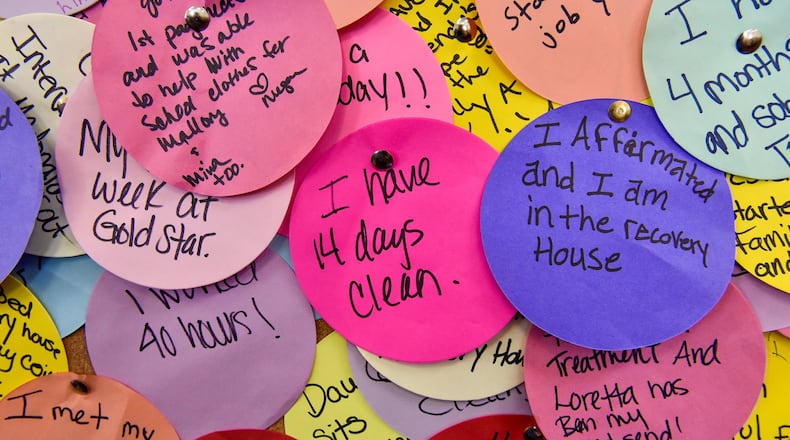David Inman was one of those graduates who now has full custody of his 8-year-old son Cayden and has been clean for about 450 days after failing residential rehab several times.
He spent two years in the program and had many relapses but, “they never gave up on me and I never gave up on myself.”
“They could have kicked me out a long time ago,” Inman told the Journal-News. “They could have said this guy’s not going to get it, cause there for a while it was my way and that’s the only way it’s going to be, but come to find out my way didn’t work, they had to show me what way worked.”
He said it is “gratifying and terrifying” now that he’s starting a new chapter of his life without court support “but it don’t stop there it really starts when you graduate from the program” because it not just about him it is about his son.
In the midst of the opioid epidemic that had a firm grip on Butler County in 2017, and with many adoptions occurring because of parents who couldn’t stay off drugs, Children Services, the Juvenile Court and mental health and addiction board decided to resurrect the family drug court that was stopped in 2012 when funds dried up.
Wilkerson said she has admitted 94 parents into the program, 37 have “transitioned” and of those 95% still have their children, 100% have stable housing, are employed or have stable income and they have had 14 drug-free babies born. She is running three dockets now and has 15 clients.
In addition to intensive drug treatment programs — largely paid for with Medicaid dollars — the court helps parents wade through legal problems, get and keep jobs, overcome transportation issues and a host of other wrap around services.
She said COVID has hit her program hard just like everyone and everything else and for a time they had to stop the weekly in-court dockets which was rough. She said some of the previous graduates said it seemed seamless when they went virtual.
“It didn’t seem seamless on our side, we worked our tails off to try to make sure all of their needs were met and they felt the same support as they would if they were in the courtroom with us, it changed things up, on a virtual platform,” Wilkerson said.
“Part of what makes drug court work so well is it’s a group process, so you’ve got people who’ve been in the program longer, mixed in with people who have been there a shorter period of time, that can share their experience. Also those newer people learn from observing.”
Everyone has gotten used to Zoom and Teams meetings, but there are confidentiality concerns. The program participants have to be assured others can’t overhear them and that’s not possible when family of group members could have walked in on a meeting with the court during the lockdown.
The county was able to reboot the program with the help of a five-year $2.1 million Substance Abuse and Mental Health Services Administration federal grant. The grant is expiring next September, and officials are hoping the county commissioners — they have indicated they will — pick up the bill for the program after that.
The grant was for about $425,000 a year and it covered the three court personnel salaries and “soft costs” like incentives, drug testing, parenting classes and other components. Court Administrator Rob Clevenger has asked the commissioners for $71,550 to cover the court expenses after the grant expires next fall because they probably can’t get any more federal money.
He said they were lucky to get the SAMHSA grant twice — for the initial program and when they restarted it 2017 — because those funds are generally just seed money. Clevenger said they will continue to seek funding to maintain the court.
“It’s definitely money well spent,” Clevenger said. “For us as a system, we went into this with the thought that we want to be able to say that we did the best we could to try you help yourself, and I feel we can say that.”
About the Author

